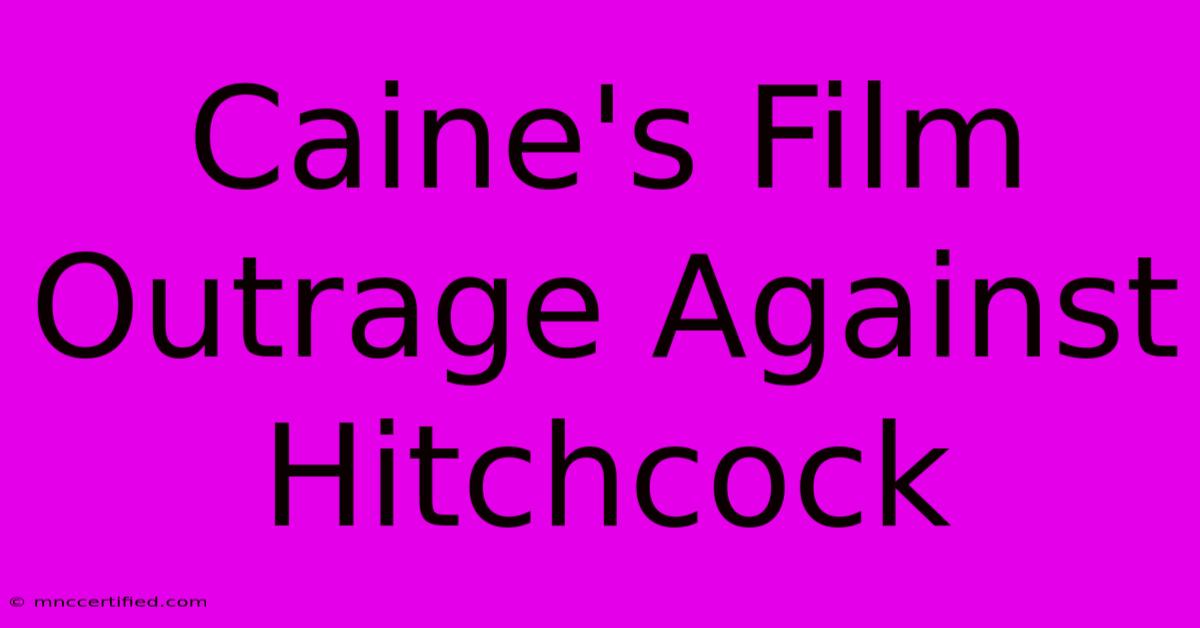Caine's Film Outrage Against Hitchcock

Table of Contents
Caine's Film Outrage Against Hitchcock: A Deep Dive into a Legendary Feud
The legendary clash between Michael Caine and Alfred Hitchcock remains a captivating chapter in cinematic history. While their collaboration on The Ipcress File (1965) yielded a critical and commercial success, it was far from a harmonious partnership. This article delves into the details of their fraught relationship, examining Caine's outspoken criticisms and the lasting impact of their conflict.
The Genesis of the Dispute: A Clash of Personalities
Caine's outspoken nature and fiercely independent spirit clashed with Hitchcock's notoriously meticulous and controlling directing style. While Hitchcock was known for his precise vision and demanding approach, Caine, even in his early career, possessed a strong sense of self and wasn't afraid to voice his opinions – a stark contrast to many actors who worked with the Master of Suspense.
This difference in temperament became increasingly apparent during the filming of The Ipcress File. While Caine's performance was lauded, accounts suggest that Hitchcock's constant direction and adjustments frequently frustrated the actor. Caine wasn't just a face; he was an intelligent and actively engaged participant in the creative process, a fact that sometimes irritated Hitchcock's preference for absolute control.
Beyond the Set: Caine's Public Criticisms
Years after The Ipcress File, Caine didn't shy away from expressing his dissatisfaction with his experience working with Hitchcock. His criticisms weren't whispered behind closed doors but openly shared in interviews and autobiographies, solidifying his reputation for honesty, even if it meant criticizing a legendary filmmaker.
These critiques weren't simply about creative differences. Caine's accounts often highlighted Hitchcock's perceived lack of respect for his actors, portraying a director more interested in technical perfection than the human element of performance. He painted a picture of a demanding, sometimes even condescending, figurehead who prioritized his own vision above the contributions of others.
The Lasting Impact: More Than Just a Feud
The Caine-Hitchcock conflict transcends a mere professional disagreement. It offers a fascinating glimpse into the power dynamics within the film industry and the sometimes-difficult relationship between director and actor. Caine's candidness shed light on the less glamorous aspects of working with a celebrated auteur, challenging the romanticized image often associated with Hitchcock.
Furthermore, this public airing of grievances highlights the importance of open communication and mutual respect in collaborative creative projects. While Hitchcock's genius is undeniable, Caine's experience serves as a cautionary tale about the potential pitfalls of an overly controlling directorial style.
Reassessing the Legacy: Beyond the Controversy
Despite the controversy, The Ipcress File remains a testament to the talent of both Caine and Hitchcock. The film's enduring popularity suggests that even a difficult collaboration can produce outstanding results. The enduring legacy of both figures, however, remains enriched by the insights into their working relationship, prompting a more nuanced appreciation of their individual contributions to cinema.
SEO Keywords for this Article:
- Michael Caine
- Alfred Hitchcock
- The Ipcress File
- Hitchcock's directing style
- Caine's criticisms
- cinematic feud
- behind-the-scenes Hollywood
- Master of Suspense
- film production
- actor-director relationships
This article aims for high search engine ranking by incorporating relevant keywords naturally throughout the text and utilizing a clear, well-structured format. Remember to promote the article across various social media platforms and utilize other off-page SEO strategies for broader reach and improved ranking.

Thank you for visiting our website wich cover about Caine's Film Outrage Against Hitchcock. We hope the information provided has been useful to you. Feel free to contact us if you have any questions or need further assistance. See you next time and dont miss to bookmark.
Featured Posts
-
Tearful Reactions Call The Midwife Season Premiere
Dec 26, 2024
-
Nfl 2024 Christmas Games Uk Tv Schedule
Dec 26, 2024
-
Konstas Debut Bumrahs Riposte Boxing Day
Dec 26, 2024
-
Hanukkah Starts On Christmas Day 202 X
Dec 26, 2024
-
Mahomes Chiefs Secure Afcs 1 Spot
Dec 26, 2024